'Wonder Woman' Interview: Patty Jenkins Aims For Richard Donner's 'Superman' Meets 'Casablanca'
Yesterday, we talked about the 16 minutes of Wonder Woman that Warner Bros. Pictures and director Patty Jenkins showed us at their post-production facility in London, not to mention details on the story presentation that laid out the events of the first act of the movie for us. Now we get to dive deeper into all the work that Jenkins has poured into this movie, which has been something she had pursued on and off for 10 years before she finally ended up behind the camera.
In between watching the Wonder Woman footage, we were able to speak with Jenkins as a group for about 40 minutes, talking about everything from how the film changed throughout the various pitches she made over the years to how much of an influence Richard Donner's Superman has been on the movie, and how they chose to approach the character through a modern lens.
Read on for our full group interview with Patty Jenkins.
Can I ask you about your journey in getting this film made? I heard that you pitched this story like 10 years ago...
It wasn't quite that I pitched it. I had been making superhero short films, hilariously, because then I went on to see a door open to write and direct Monster. So I was like, great, I'll do that. Then suddenly, I was a super dark director. But people who knew me growing up were like, "Of course you're making Wonder Woman." That's the irony. The irony is that it was much more shocking that I made Monster than it was that I made this.
I don't love all superhero films, but I love a great one. So I had my first meeting with Warner Bros. in 2004. They said, "Hey, we're interested in meeting. What do you want to do?" I said, "Wonder Woman. I want to do Wonder Woman." Since then, I came in every year to have a meeting about it at some point. It's funny, because my Mom actually sent me the script and I've got to frame it somewhere, but I have a copy of a submission to me, like, "Patty, we'd love for you to consider writing and directing Wonder Woman." And I was pregnant when I got it. It was 2008, and I was like, "Well, I can't now. Now's not the time to do it." Then it went on its own journeys, and I kept going and talking about it.
So then when this came back around, I had been around the block. I almost did Thor and saw how that went. The story turned into something where I didn't feel I was the right director for [it]. You just start to have respect for things where you have the right director. So when it first came back around, it was finding its place in the universe. It was more speculative. Maybe I am, maybe I'm not. I've always wanted to do Wonder Woman, but now it's complicated. Because now it's in a whole other thing. It's not just me coming in and doing it.
But they went on their journey, then it turned out they found themselves wanting to do exactly what I had been wanting to do for all those years, which is just a straight-up origin story. I just want to do the origin story and be really straightforward about it. Then they came back to me and said, "We want to do the origin story." I said, "So do I! Let's go!" So it was interesting because it was both a sudden thing but also an easy sudden thing, because I had been talking about it, and thinking about it, pulling photographs. My assistant, who's with me here today, Anderson, he and I have pulled photos for this movie and put together a visual presentation for how it would be done many times. So in a way, it was like, boom, I know exactly how I want to do this movie.
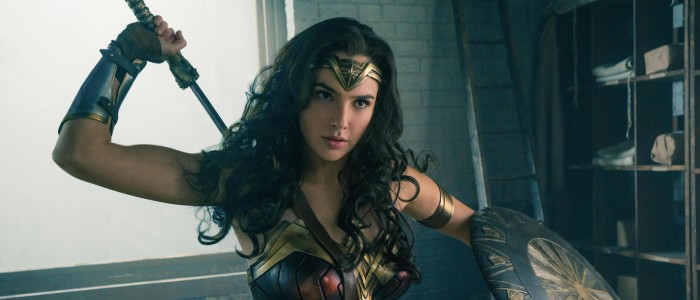 There's always a context under which the viewer is watching it, and for me, as a woman, watching this film, there's a context under which over the last 10 years, or even 20 years, a lot has changed for women with the rise of digital media, the feminist movement has reached kind of a new age with social media as well, the representation of women. So I'm wondering whether any changes in our times have informed how true to the character you wanted to be. And you as a woman, in Hollywood as well, you're actually one of a minority of women role models that we look to.
There's always a context under which the viewer is watching it, and for me, as a woman, watching this film, there's a context under which over the last 10 years, or even 20 years, a lot has changed for women with the rise of digital media, the feminist movement has reached kind of a new age with social media as well, the representation of women. So I'm wondering whether any changes in our times have informed how true to the character you wanted to be. And you as a woman, in Hollywood as well, you're actually one of a minority of women role models that we look to.
It did change, but interestingly it changed in a slightly different way. I went into saying "She's my Superman." She can't be dark and angry and nasty. I kept seeing that female heroes always had to be some alt character. They couldn't just be the main lead. They had to be made more interesting somehow. And I was like, no, no, no, no, no. Not her. She's just going to be Wonder Woman. She's Wonder Woman. I love Wonder Woman. Let her be.
I think the thing that surprised me is that I came in naively thinking let's make that. But there was more fear in the world, at every studio, about doing that kind of thing. Just a belief that only boys liked action movies and boys didn't like female characters. So what do you do to address that? That's what changed. Things like Hunger Games started to show something else was possible. I think the way I always wanted to do it became possible.
I grew up in a bit of a feminist fantasy with a single mom. I was totally shielded, in a way, from the idea that I couldn't do something or couldn't be something. I felt like it's been more of an education to me. Like, why can't everybody see that it doesn't matter if it's about a dog or a woman or a person from another country, it's about the story you're telling. We've told universal stories about different things. I think people were much more nervous about that than they are now. It's ironic that you could make an animated film about a dog as a universal character, but God forbid it be a human being...
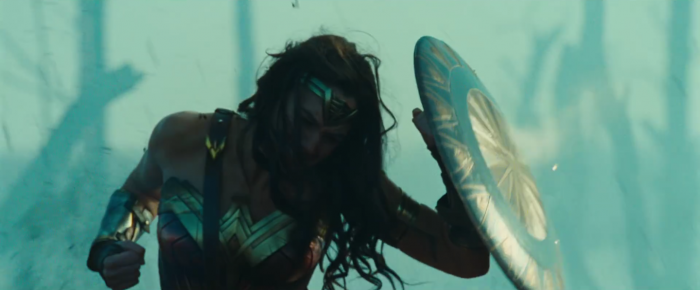 I love the way she says in the clip you played, "I'm the man who can."
I love the way she says in the clip you played, "I'm the man who can."
Exactly. It's funny, because we just replaced that line with a different reading, and I don't like it as much. Because the one that I like is where she's completely oblivious at the meaning of it. She's like, "I'm the man who can." That's what it sounded more like before. Now it sounds a tiny bit strident, like "I'm the man who can." She has no feminist agenda at all. It never occurred to her that anybody would be, that was what made her being, like Having any kind of feminist storyline at all...she can never be lecturing and she can never be scolding. Because she just walks out like, "What's going on? Why would this be happening? Why are you acting like that? What's the problem?" Which is such a funnier way to look at it and talk about it. Like, "That's absurd! Why wouldn't I fight"' So we had fun with that part of it.
How much changed between your earlier pitches and what ended up in the movie?
It changed every time, I think. I had a couple versions that were modern day, and you find someone who's the long lost, great, great, great, grandchild or whatever of Wonder Woman. And you're like, "Oh, there was a story in the 60s about this person who used to be Wonder Woman." So you're referencing Lynda Carter more and kind of saying, "Oh there was this superhero, Wonder Woman, who walked the Earth and did all these things." And then as the story starts to progress, she's like, "Yeah, my grandmother, whatever." But then at some point, boom, some moment comes, and you're like "Oh, that's her. She's just immortal. She just went into hiding all this time."
It was always various ways of whether it had to be the original origin story or do we jump into modern times. I didn't want to do her origin story in modern times. It was depending on which way it could be done. It was about making it a modern movie. Thor is fine to go into modern times because people don't really associate him with the '70s or '60s. But her, she is kind of associated. She's a little time stamped, so I didn't want to start with that story now.
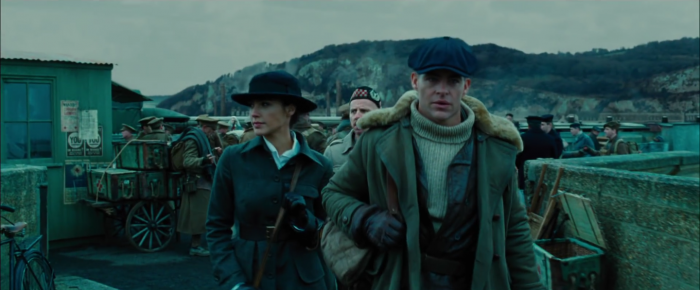 When did you start focusing on a World War I backdrop for this story?
When did you start focusing on a World War I backdrop for this story?
That was a decision that I actually stepped into. When I had talked to them about it before, it was always assumed that it was World War II, and then when I came in to the project, the studio and Zack [Snyder] and everybody had decided, "Oh, let's look at World War I." And I ended up loving it. I was like, "Wow, that's really interesting." Because you've seen so many World War II movies and it's such a well known story. Whereas if you're looking at a god with an ideal belief system coming into a man's world, World War I was the first time that we had mechanized war, that we started bombing people from afar, that it was a war without any kind of pride or system of what was honorable and what wasn't, shooting people from afar. They've always been shooting people from afar, but they didn't have the technology to do it in the same way.
It became a cool thing to explore a different period of time and tell a story that you haven't seen before. And, "Who's the bad guy?" was much more gray in World War I, which made it interesting, because [there's not just a] straight-up villain or obvious villain. [Diana] ends up being able to question, "Wait, what's going on here? Why are you firing that gun? Aren't you on the good side?" The complicated nature of that was really fascinating, of her observation of man.
How has the character of Steve Trevor changed through your various versions, and also, how difficult is he as a character to get right. I imagine you don't want him to be a damsel in distress type character.
Yeah, not at all. He actually is very difficult, but also very easy, in a way. He hasn't changed, not at all, since I've ever been interested, because of exactly that. I didn't want him to be a damsel in distress. I didn't want to make an issue out of it. I didn't want to make a feminist statement with him. I wanted the guy, who you want to be with, who's cool that you're trying to do something else at the same time. And I want it to live up to that emotionally myself. Who's the guy who can be like, "Well, that was a little intimidating." But they can still help you when you need help. Or love you, or support you, or whatever.
Since the beginning, I cared passionately about hitting that same target that anybody would want to hit for your love interest. Make him someone I am in love with, who believes in me, and helps me where I have weakness. And the vulnerability of that relationship meant everything to me. And I would say it all the time throughout the movie to other people. I was like, "You would never to do that to Superman. You would never do that to Lois Lane"' If people would ever have this "Well, she can't need his help." I'm like, "So if Superman was like 'Fuck you, Lois,' how satisfying would that be?" They have to need each other. It has to be a love story. Everybody has to be stronger or more powerful. We just have to make it work in that sort of way, and we can't overthink what it means to say she needs him for a second, or he knows more than her in this way, and she knows more than him in this way. She's a superhero. Don't worry about her. I think Superman is a great parallel for that. All of them are. You wouldn't do that to Gwen Stacy. You wouldn't do it to anybody. It's important all those people have their people in the world who believe in them and love them and help them, yet understand their lives are complicated.
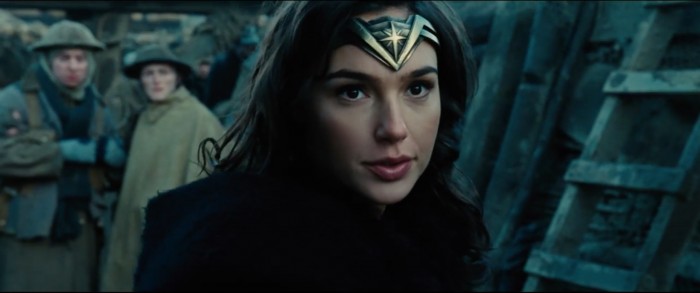 You mentioned Gwen Stacy, and obviously you have history with Marvel. What do you think is the most striking difference between the two universes in your experience?
You mentioned Gwen Stacy, and obviously you have history with Marvel. What do you think is the most striking difference between the two universes in your experience?
I don't know. I think there's been a tonal...like sometimes Marvel goes for more fun and DC goes to make a more serious film. But I think there are shades of gray in all of it. Like I think Doctor Strange was a more serious film, and I think this is sort of a lighter film. I don't think Suicide Squad was particularly un-light. They're all over the place. I think there may be slightly more consistency in the tone of Marvel films recently, but I don't think it will always stay that way. I love them both. I will never stop being grateful to Marvel for wanting me to do their movie. That's not an obvious choice. I met them, we hit it off and made great conversations about it. At the time it seemed like they could go a lot of different ways, and they wanted to go the way I wanted to go. Then things shifted and they realized they needed to go another way to fit into their universe, and it was not something that I find myself suited for. So it was a much more peaceful departure, but I've always had fond memories of them, and I respect what they do.
Can you talk about the pressure? You're coming into the biggest genre that's going on right now. There are so many filmmakers that have come and gone off these projects that there's so much pressure to deliver on an intense level for these projects. I'm just curious, can you talk about what that experience has been like for you? Not just making the movie you want to make, but also making a movie that's fitting into a wider universe, and also in the biggest genre in Hollywood right now.
There are two different realities going on. The one reality is the idea of getting to make a movie, to make something you're already aiming so high for yourself, it makes it harder to make a film. So on one hand, almost nothing changed. My relationship to this movie is still, "Am I the right director? Can I do it? Can I make it great? Oh my God, are we getting close? Oh God, don't let it get messed up." It's like the same ride in a way. But certainly I flipped back out to this intense focus of what this movie means and what does it stand for. I was very aware of that with Thor where I was like, if I'm not confident that I'm the best person for this movie, and I'm not confident I could make a good movie out of this, this is politically a big step backwards for women directing blockbusters.
You do have to be very aware the whole time that these people need something great. Do I believe I can aim for great with them and that we have a chance? You have to be aware of what their needs are too, but in this case, slightly less intense. Because I believe in exactly a great Wonder Woman. I don't have an alt agenda. I believe in a great Wonder Woman origin story too. So all of those conversations become better. It's definitely an interesting life experience, fascinating all the time. This is wild, how much it matters to a lot of people and girding yourself for the fact–girding my son as I talk to him–that somebody is going to say everything. Somebody's gonna hate it, somebody's gonna like it, somebody's gonna think it should be this way or that way. And you hope for the best, but you also have to know you're stepping into a very intense world where she belongs to a lot of people. You have a lot of people to please.
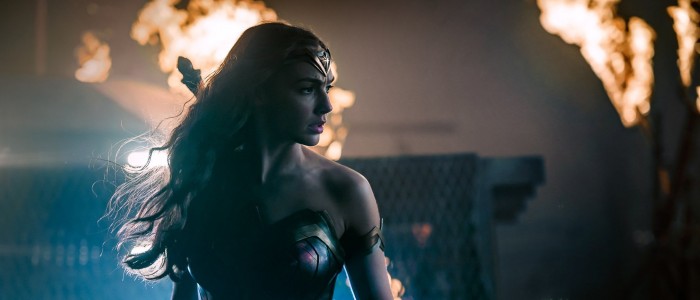 How involved are you working with [comic book writer and DC CCO] Geoff Johns?
How involved are you working with [comic book writer and DC CCO] Geoff Johns?
Geoff and I are very close, super close. Since my first meeting ever, years and years ago, I pitched a storyline and Geoff Johns' eyes lit up and he said, "That's what Dick Donner did for Superman." And he and I were like ding, so we've become super close. We have very similar goals for this movie. I love him and his work. I'm so grateful he's around.
Obviously Richard Donner's Superman is a major influence, but were there certain other types of genres or war films that you were drawing upon for the vocabulary of a film set in this time period?
It ended up being very Superman. For me it's Casablanca a lot. It came up a lot. And Indiana Jones. It's those three films. It's a classic film. We're making a classic film. We care about humor. We care about epic. We care about heroicism. We care about arc and story. Make it elegant. Go for it. Don't hold back. Just try for that pocket all the time. Really those three films with a kind of war hero, who Steve Trevor is. Indiana Jones or Rick from Casablanca meets Wonder Woman and I'm in.
Can you talk about Etta Candy's bond with Wonder Woman since they're so close in the comics?
There are several different versions of Etta. She's the version that works for Steve, obviously. She becomes the humorous woman who is specifically entrenched in this time period of the world where it is sexist and it's all those things. But she's got a great sense of humor and a great way of handling and navigating all of that and she adores Diana. So that's the spirit of Etta Candy.
Will Wonder Woman's theme show up in the movie?
It's gonna show up, although it's an interesting thing. It is a great theme, but it is a very specific theme. So it's not the kind of thing you can just ladle all over a little girl, or a naive person, so it has its own journey. I see the movie as both the creation of the character and the theme. But it's not the easiest thing to just throw all over the place.
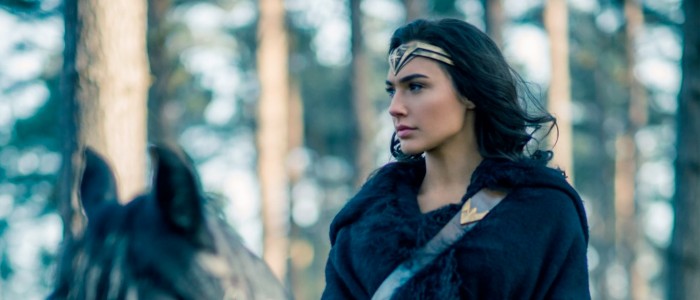 When you're in post, are you using temp tracks like this as inspiration for your cut? Or do you have your cut in mind and then you're just applying music to it so you can get an idea of tone while you're watching? What's that process like?
When you're in post, are you using temp tracks like this as inspiration for your cut? Or do you have your cut in mind and then you're just applying music to it so you can get an idea of tone while you're watching? What's that process like?
It's a little of both. There are a number of things like this that I ended up creating to the track in the first place. So when I started doing storyboards, I was trying to figure out pacing myself. It was an interesting one because a lot of people didn't understand what I wanted, like with No Man's Land. People asked, "What are you gonna do? How many bullets can she block?" And I was saying, it's not about that. It's not about action or fighting, it's about her. It's about "I'm gonna do this thing," and then getting her way across. So it's a very dramatic scene. You're all just in a dramatic point of view, which is what I've loved about doing this movie, having a very strong dramatic point of view about where's she's coming from in every scene. As a result, I storyboarded it and treated it very much like I would a dramatic scene. It's this rhythm. So I needed to see how many shots I wanted for each of those moments to build to that rhythm. So this was something that I found early on where I was, "Like this!"
But then there are other places where it's a fascinating process like, "Well, I would have thought this kind of music would work," but it didn't. I'm a very musical person, so I think that way a lot. The same way that I'm a writer, I am with music later. I'll write a scene 50 times to figure out exactly what I'm looking for, and I'll throw 50 tracks up and be like, "Oh, that's interesting." Like the boat scene, such a romantic track. You wouldn't think that would be so funny. It turns out that's exactly what's funny. It's that the music is being completely sincere while they're just incredibly awkward. If you put music on it that played the awkwardness, it wouldn't be as awkward, because you'd be overdoing it. But instead you're like, "Isn't this wonderful?" And they're like, "...Soooo." And that turns out to be a much funnier blend. So that process of tonal discovery is really cool and integral. Because then once you get a composer on, you're like, "I've already tried sincere. Sincere didn't work and here's why. So let loose."
***
What was great about this interview is that Patty Jenkins never really felt like she was tapdancing. She feels like someone who is very self-aware and dedicated to making not only the Wonder Woman movie she has always wanted to make, but one that resonates with fans of all ages. It speaks very highly that she has a keen sense of whether she's right for a project, and simply having the courage to take on something as daunting as Wonder Woman is an achievement in itself.
Between hearing what Patty Jenkins had to say about her approach to the movie and the footage that we saw in London, I'm really pulling for Wonder Woman to help the DCEU get back on track for those of us who haven't been impressed by their cinematic offerings so far.
What do you think?
